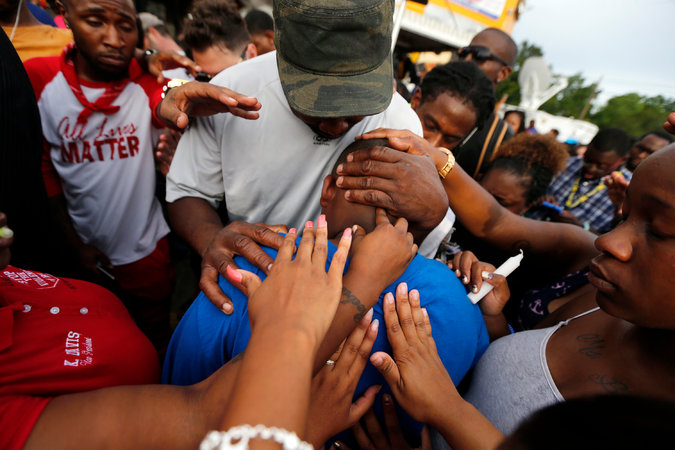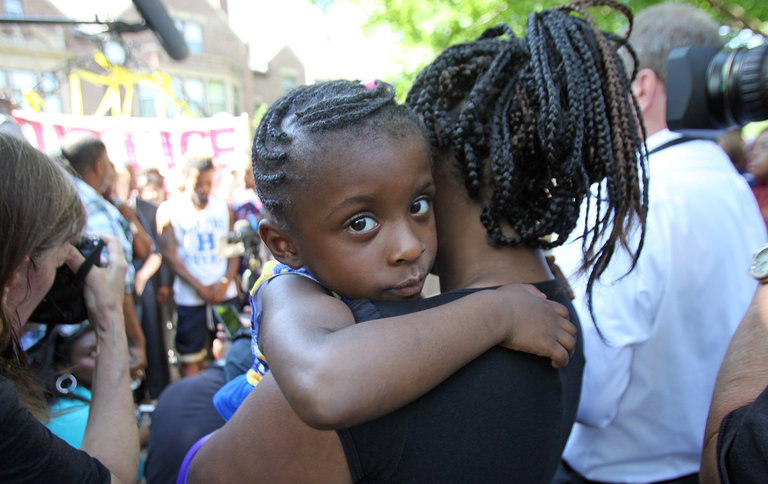In the Turmoil Over Race and Policing, Children Pay a Steep Emotional Price
Share
Explore Our Galleries
Breaking News!
Today's news and culture by Black and other reporters in the Black and mainstream media.
Ways to Support ABHM?
By

Cameron Sterling being comforted at a vigil near where his father, Alton, was killed by the police in Baton Rouge, La., last week. Credit Gerald Herbert/Associated Press
In the past week alone, there was the 4-year-old girl in Falcon Heights, Minn., who was captured on video consoling her mother after they watched a police officer shoot the mother’s boyfriend through the window of a car. And there was the 15-year-old boy in Baton Rouge, La., who sobbed uncontrollably in front of television cameras after the similar shooting death of his father.
Then there were the four brothers, ages 12 to 17, whose mother was shot by the sniper who opened fire on officers in Dallas on Thursday night while the family was protesting police violence against blacks. The mother, who survived, threw herself atop one boy, as the others ran for their lives.
Again and again, children are finding themselves enmeshed in the country’s roiling debate over police treatment of African-Americans. The close-up views of violence, obviously traumatizing, are giving rise to a generation of young people who distrust authority, grow up well before their time and suffer nightmares that seem too real.
“As a mother, I have now been forced to raise a son who is going to remember what happened to his father,” said Quinyetta McMillon, the mother of the boy in Louisiana who sobbed over the death of his father, Alton Sterling. “That I can’t take away from him.”
While adults around them protest and demand criminal justice reform, young witnesses of the carnage are reeling from their losses and harboring pent-up depression that often comes pouring out in panic attacks and breakdowns, relatives say.

The daughter of Diamond Reynolds, whose boyfriend, Philando Castile, was shot by the police in Minnesota last week. Credit Eric Miller/Reuters
The list of young people burdened by these tumultuous times includes Tamir Rice’s teenage sister, who lost 50 pounds after watching the police shoot him in 2014; the daughter of Oscar Grant III, killed by a transit officer while lying down on a California train platform in 2009, who as a 5-year-old would ask playmates to duck when she saw the police; and the 9-year-old nephew of Sandra Bland, who began sleeping in his mother’s room after Ms. Bland’s death last year in a jail cell.
“They are aware of what’s going in the world, of how you can leave your house and you can very well end up in a body bag,” said a sister of Ms. Bland’s, Shante Needham, whose four children continue to struggle with the death of their aunt. “They watch the news. They see all the stuff going on on Facebook. And it’s sad that kids even have to think like that, that if I get stopped by the police, I may not make it home.”…
Read the full article here.
More Breaking News here.









Comments Are Welcome
Note: We moderate submissions in order to create a space for meaningful dialogue, a space where museum visitors – adults and youth –– can exchange informed, thoughtful, and relevant comments that add value to our exhibits.
Racial slurs, personal attacks, obscenity, profanity, and SHOUTING do not meet the above standard. Such comments are posted in the exhibit Hateful Speech. Commercial promotions, impersonations, and incoherent comments likewise fail to meet our goals, so will not be posted. Submissions longer than 120 words will be shortened.
See our full Comments Policy here.